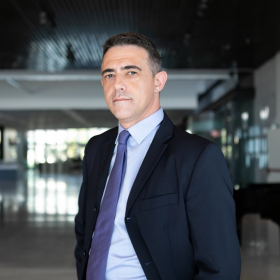

Stefano (Boards of Appeal – EUIPO)
"I am from Italy and my hometown is Bologna, in the Emilia-Romagna region.
I work as a legal assistant at the Boards of Appeal. My daily work mostly consists of drafting appeal decisions. In this position, I have the chance to deal with many legal grounds and complex cases relating to EU trade marks and registered Community designs. This makes my daily work very various and interesting under several aspects. I am also an accredited mediator and occasionally I have the chance to litigate before the General Court of the EU. In particular my role as a mediator makes my work closer to users and their most profound interests. As an IP professional and previously an attorney-at-law, getting back in touch with ‘clients’ and providing them with effective dispute resolution tools is a part of the work I was truly missing.
I really enjoy living close to the sea and enjoy Alicante’s beaches. Nevertheless, my favorite places in Alicante are its coves where the water is often crystalline, and one can enjoy a more natural, peaceful and private environment. I also like other sea spots in Alicante’s province such as Playa La Granadella or mountain natural springs in the interior such as El Toll Blau where the environment is greener and fresher.
Becoming an IP specialist at the EUIPO is a unique opportunity to join a multicultural and very dynamic work environment and represents an important challenge for any IP professional who wishes to give a tangible contribution to the EU economy and IP ecosystem. The EUIPO has been awarded as the most innovative IP Office and I can agree that new professional paths are always possible here. Furthermore, working with such great experts from all over the EU and sharing different professional and personal backgrounds is a very enriching experience which makes me continuously improve my skills and broaden my competences."
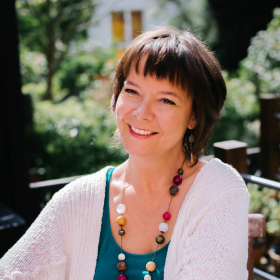
Susanne (Council of the EU)
"Being a policy officer in the field of migration fully corresponds to what has been my main subject of interest ever since I studied refugee law at university. Gaining hands-on experience from both the Danish Immigration Service and UNHCR and witnessing a real refugee crisis in 1996-97 certainly gave me an insight I have used a lot since I started in the migration team in the Council Secretariat back in 2015, right at the beginning of a refugee crisis in Europe. It is also tough to do this line of work because you deal with a policy that affects many thousands of people directly every day and there are no easy solutions."
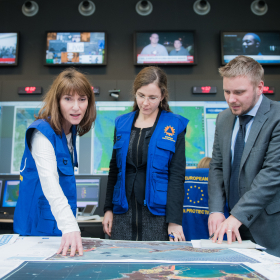
Maria (European Commission)
"My name is Maria and I am Spanish, from Madrid. I have lived in Brussels for the last 20 years and I have to say that I have very much enjoyed it since the start. Brussels is a not so big, but it is very cosmopolitan, which suits me very well. In the streets, you overhear so many languages and see so many different types of people, which strangely makes me feel at home.
Having a background as a lawyer, I have been working in DG ECHO since 2008. DG ECHO deals with Humanitarian Aid and Civil Protection. Specifically, since 2016 I have been working in the directorate dealing with emergencies, first in the European Emergency Response Center (ERCC) and now dealing with the European Humanitarian Response Capacities (EHRC).
The ERCC helps to coordinate a coherent EU response to major disasters occurring inside and outside the EU: earthquakes, conflicts, cyclones, floods, etc. The unit provides a platform for coordination within the EU institutions and Member States. The Center also has a 24/7 duty system that coordinates with partners like the UN, international organizations, NGOs and other crises centers in the EU and the world.
Concretely, now I work as a Team Leader in the EHRC which designs, follows, and monitors DG ECHO's directly implemented operations outside the EU, especially after emergencies: transport of humanitarian cargo, passengers, establishment of warehouses for partners, regular routes for inaccessible areas in central Africa, emergency expertise, etc.
Unfortunately, there are too many crises in the world, but what I really like about my job is that I can bring my contribution whenever disasters strike vulnerable populations, partially fighting the feeling of helplessness that we all have before them.
If you feel this itch and like to work in an international environment, I encourage you to join us. It is also a very dynamic environment, with many dedicated colleagues driven by a shared passion to bring European solidarity to those in need. Good and committed professionals have plenty opportunities to grow, travel, live abroad while doing a fulfilling job at the European institutions."
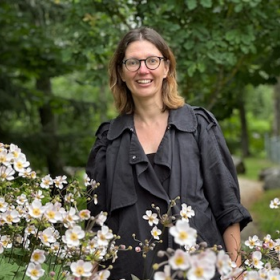
Sigita (Court of Justice of the EU)
Teisingumo Teisme pradėjau dirbti beveik tuo pat metu, kai Lietuva įstojo į Europos Sąjungą, neseniai baigusi teisės studijas Lietuvoje ir Prancūzijoje. Tuo metu buvo labai mažai lietuvių teisininkų, kurie mokėtų prancūzų kalbą taip gerai, kad sugebėtų išversti teisinį tekstą. Ir ne bet kokį teisinį tekstą, o tokį, kuriame Europos Sąjungos teisė persipynusi su valstybių narių teisės sistemomis ir kyla sudėtingų teisės taikymo problemų labai įvairiose srityse, net tokiose, kurios Lietuvoje tuo metu buvo tik pradedamos plėtoti. Taigi, siekiant kuo tiksliau gimtąja kalba perteikti Teisingumo Teismo teisinę mintį, teko ir tebetenka nemažai paplušėti: pasirausti bylos dokumentuose, pasikonsultuoti su kolegomis, kalbininkais, teisėjų kabinetų nariais ir kitomis tarnybomis ar net apsilankyti didžiausioje Europos Sąjungos teisinių leidinių bibliotekoje.
Dirbdama dvidešimt metų tarptautinėje Liuksemburgo aplinkoje su kompetentingais kolegomis, ES teisės ir lyginamosios teisės specialistais, labai daug išmokau. Šiuo metu teisinius dokumentus verčiu ne tik iš prancūzų, bet ir anglų bei ispanų kalbų, mokausi vokiečių. Man labai patinka, kad mano darbe profesinis mokymasis (įskaitant užsienio kalbas) labai skatinamas ir sudarytos puikios sąlygos kompetenciją tobulinti tiek institucijos viduje, tiek seminaruose ar mokymuose visoje Europoje. Dėl technologijų raidos teisininko lingvisto profesija per šį laikotarpį labai pakito, ir man kartu su kolegomis teko įgyti daug visiškai naujų įgūdžių. Šaunu, kad mūsų institucijoje tam sudarytos puikios sąlygos, taip pat užtikrinamos geros socialinės garantijos, puikiai įrengtos darbo vietos, o lankstaus darbo grafiko galimybė labai padeda suderinti šeimos ir profesinį gyvenimą. Institucijoje rūpinamasi ir malonia darbo aplinka: organizuojami kultūriniai, sportiniai, socialiniai renginiai, asmeninio tobulėjimo mokymai, darbo dieną smagu aktyviai pradėti ar užbaigti dideliame sporto centre.
Nekantrauju Jus, savo naują kolegą, pasveikinti Europos Sąjungos Teisingumo Teisme!
Nuoširdūs linkėjimai iš gražiojo Liuksemburgo,
***
I joined the Court of Justice almost at the same time as Lithuania joined the European Union, having recently graduated in law in Lithuania and France. At that time, there were very few Lithuanian lawyers who knew French well enough to translate a legal text. And not just any legal text, but one in which European Union law is intertwined with the legal systems of the Member States, and which raises complex problems of legal application in a wide variety of areas, even in areas that were just beginning to be developed in Lithuania at the time. Thus, in order to convey the Court of Justice's legal reasoning as accurately as possible in my native language, it has been, and continues to be, necessary to do a great deal of work: to review case documents, to consult colleagues, linguists, members of the judges' chambers and other services, and even to visit the largest library of European Union law publications.
Working for twenty years in the international environment of Luxembourg with professional colleagues, specialists in EU law and comparative law, I have learnt a lot. I am currently translating legal documents not only from French, but also from English and Spanish, and I am studying German. I like the fact that professional learning (including foreign languages) is very much encouraged in my job and that there are excellent opportunities to develop my competences, both within the institution and in seminars or training courses throughout Europe. Technological developments have changed the legal linguistics profession considerably during this period, and I have had to acquire many completely new skills, as have my colleagues. It is great that our institution offers excellent conditions for this professional development, as well as good social security, well-equipped workplaces and the possibility of a flexible work schedule, which is a great help in reconciling family and professional life. The institution also provides a pleasant working environment, with cultural, sporting and social events, personal development training, and a great place to start or end the working day with a session in the large sports centre.
I look forward to welcoming you, my new colleague, to the Court of Justice of the European Union!
Sincere greetings from the beautiful city of Luxembourg,
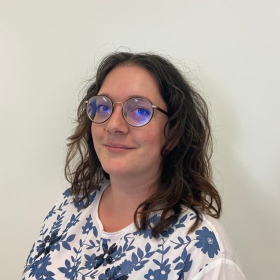
Molly (Court of Justice of the EU)
“I have been an official for the past year and a half, but I have been at the Court of Justice, first as a trainee then a temporary agent, since 2017 (with a break to continue my legal training). I trained as a translator, which I followed up with a law diploma – a requirement for lawyer linguists at the Court of Justice – before coming to Court as a trainee with the English language translation unit.
My working languages are French, German, Italian, Spanish and Greek – one of the aspects of working for the EU that I appreciate the most is how multilingualism is an integral part of everything we do, so my languages are put to practical use on a daily basis!”
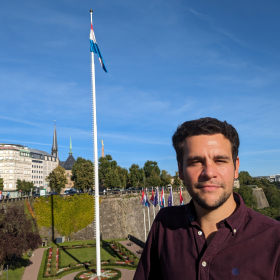
Gregorio (Court of Justice of the EU)
“I have been working as a lawyer-linguist for the Spanish translation unit of the Court of Justice of the European Union since 2017. My main tasks include translating and revising translations of documents of the Court of Justice (judgments, orders, opinions...). Furthermore, I analyse and summarise references for a preliminary ruling submitted by Spanish courts.
My job allows me to combine my two areas of specialisation, i.e. the law and languages. In addition to working in a multilingual environment, carrying out my tasks autonomously and learning new languages, I consider it a privilege to translate the case law of the Court of Justice into my mother tongue and to be in close contact with developments and changes in European Union law.”
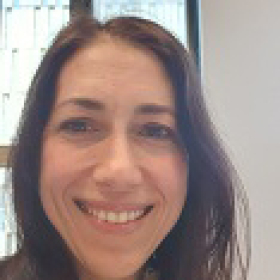
Susana (Court of Justice of the EU)
“Trabalhar como jurista-linguista no Tribunal de Justiça permite ter um conhecimento profundo da jurisprudência da União num alargado domínio de áreas do Direito, como por exemplo Direito da Concorrência, do Ambiente, Penal ou Fiscal. Também permite ter uma perspetiva dos sistemas jurídicos e da legislação nacional dos Estados-Membros. É um trabalho enriquecedor e desafiante, que exige um bom conhecimento de diferentes línguas da União. Por outro lado, os juristas-linguistas estão também envolvidos em vários projetos, como por exemplo no âmbito da terminologia, das ferramentas informáticas de tradução, prestando ainda apoio aos outros serviços do Tribunal de Justiça.”
***
“Working as a lawyer-linguist in the ECJ allows you to have a broad knowledge of European case-law in a wide range of subjects, including competition, environmental, criminal or tax law. It also gives you an overview of the Member States legal systems and national legislations. It is a fulfilling and challenging job, which requires a good command of several EU languages. Lawyer linguists are also involved in a number of other projects, for example in the field of terminology, software tools and support to other Units and services of the Court.”
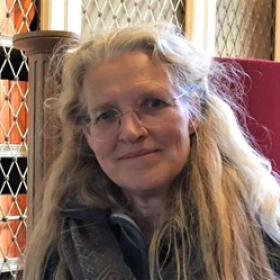
Ingrid (Court of Justice of the EU)
“Ik ben Ingrid en werk al meer dan 20 jaar als jurist-linguïst bij het Hof van Justitie. Ervaren collega’s leerden mij de kneepjes van het vak. Dankzij hen kon ik al snel zelfstandig vertalen. Tegenwoordig ondersteun ik nieuwe collega’s door kwaliteitscontrole te verrichten. Het werk schenkt me nog steeds bijzonder veel voldoening.
Of ik nu vertaal of controleer, het blijft boeiend om steeds met zeer verschillende juridische, veelal actuele, onderwerpen bezig te zijn: asielproblematiek, grote kartelzaken, bescherming bedreigde diersoorten, om er maar enkele te noemen. Ook al woon ik nu in Luxemburg, via de zaken bij het Hof ben ik steeds in zekere zin betrokken bij de grote maatschappelijke problemen in de verschillende lidstaten, dus ook in Nederland.
Voor de vrije tijd buiten het werk is Luxemburg een heerlijk land om in te wonen, vooral ook voor natuurliefhebbers: er zijn ontelbare wandelroutes door prachtige landschappen en je hoeft er nooit ver voor te reizen.”

Maggy (Court of Justice of the EU)
“Ik beken: het heeft destijds niet veel gescheeld of ik had mijn kans om bij het Hof aan de slag te gaan gemist. Ik zat namelijk middenin de examenperiode – en dus met mijn neus in de studieboeken en niet in de krant – toen het Hof een advertentie voor de job van jurist-vertaler bij de Nederlandse vertaalafdeling publiceerde …
Gelukkig was er mijn partner! Ik herinner me als de dag van gisteren hoe hij de aankondiging naar me toe schoof en terloops vroeg of “dit misschien iets voor mij was”?
NATUURLIJK was dit iets voor mij!! Na mijn studies Romaanse filologie aan de Universiteit Antwerpen had ik een baan gevonden bij een grote juridische uitgeverij, en na een tijdje had ik zin gekregen om rechten te gaan studeren. Zo gezegd, zo gedaan: toen de advertentie van het Hof verscheen, was ik mijn laatste examens aan de Vrije Universiteit Brussel aan het afleggen … Ik besefte meteen: hier had ik van gedroomd! Ik was gek op taal en had (bijna) een diploma rechten op zak – een mooiere combinatie was nauwelijks denkbaar!
Ik heb dus niet getwijfeld en, zie, inmiddels ben ik net geen 20 jaar bij het Hof in dienst …
De eerste tijd bij het Hof is best intensief: professioneel kom je in een nieuwe, internationale omgeving terecht en je hebt nog heel wat te leren. Geen nood, want je kan rekenen op fijne collega’s die je graag een handje helpen! Ook privé kom je in een nieuwe omgeving terecht. Mijn partner en ik hebben ervoor gekozen om in de Belgische Ardennen te gaan wonen. Prachtig is het daar! Je kan er eindeloos wandelen, fietsen en joggen. En als je eens geen zin hebt in natuur, is de stad nooit echt ver weg.
Maar ook na de “opstartperiode” blijft het een pittige job, die niet gaat vervelen. In hun teksten buigen het Hof en het Gerecht zich over grote actuele thema’s, en als jurist-vertaler zit je in een bevoorrechte positie om de trends in de rechtspraak van de hoogste Europese rechterlijke instanties op de voet te volgen. Net als de maatschappij evolueert uiteraard ook het vak zelf: de hedendaagse vertaaltechnieken bieden nieuwe mogelijkheden, maar stellen de jurist-vertaler ook voor nieuwe uitdagingen.
Zie jij een uitdaging wel zitten? Dan horen we graag van je!”
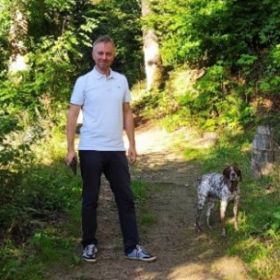
Stefan (Court of Justice of the EU)
“Mijn naam is Stefan. De combinatie van recht en talen heeft me naar het hart van Luxemburg gebracht. Doordat ik vertaalwetenschap heb gestudeerd en daarnaast ook een rechtenopleiding heb voltooid, voelt werken bij het Hof van Justitie als thuiskomen. Hier krijg ik volop de kans om mijn juridische en taalkundige vaardigheden in de praktijk te gebruiken om vragen van nationale rechters, conclusies van de advocaten-generaal en uitspraken van het Hof naar mijn eigen taal om te zetten. Door de veelzijdigheid aan onderwerpen en de terminologische uitdagingen gaat dit werk nooit vervelen. Ik heb ook nieuwe talen geleerd en me verder kunnen bekwamen in de talen die ik al sprak. De contacten met collega’s van andere afdelingen hebben mijn blik op de wereld ontegenzeggelijk verruimd. Ook heb ik op het Hof de Spaanse schone leren kennen die ik nu mijn vrouw mag noemen.
Luxemburg – met zijn vele banken en verschillende Europese instellingen – ademt een internationale sfeer uit. Het is een bruisende stad waar je leuk kan shoppen en uit eten kan gaan. Ook voor cultuur hoef je niet ver te zoeken, met een aanbod dat ongewoon groot is voor een stad van die omvang. Onder meer het museum voor moderne kunst en het concerthuis, twee pareltjes van architectuur, zijn zeker een bezoek waard. Voor wie het wat ruiger mag zijn, is er de Rockhal. En voor mensen met honden is het Groothertogdom een waar paradijs. Zo is er altijd een bos bij je in de buurt!”

